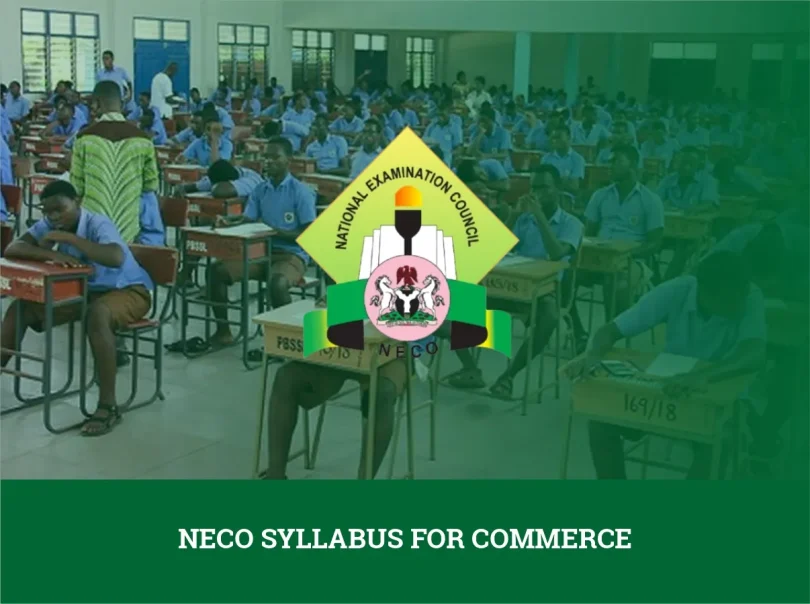NECO Syllabus For Commerce: If you are a student in the commercial and business studies track who applied for the 2026/2027 NECO, commerce must be one of the subjects selected. You must have a foundation in Commerce to understand the world of trade, business, and money. To pass the NECO Commerce exam, you need to study effectively using the NECO Syllabus for Commerce as a checklist or guide.
In this article, we will show you everything you need to know about the NECO syllabus for commerce, why it is important to study using the syllabus, the key details and topics of the syllabus, and other important information. Ensure you follow the information provided to guide you through the process and study the tips to ensure you succeed in the exams exceptionally in just one sitting. Let us guide you!
What Is The NECO Exam, And Why Is It Important?
National Examinations Council (NECO) is a school exam taken by students in SS3 (final year of secondary school in Nigeria). The NECO exams check how well students have learned their school subjects, and it is also one of the exams you need to get into universities, polytechnics, or colleges in Nigeria.
Importance: NECO is needed for admission into higher institutions and is recognized across Nigeria. NECO gives students a second chance if they didn’t pass WAEC, and it can be used to get jobs that require a secondary school certificate. Students need to ensure they pass the NECO examination as it is a step towards having a successful career goals.
NECO Commerce Exam Overview
The exam has two papers:
- Paper I – Objective (Multiple Choice) with 50 questions from all parts of the syllabus and time: 1 hour
- Paper II – Essay (Theory Questions). Students need to answer longer questions that need definitions, explanations, and examples, using time: 2 hours
Key Topics/Details to Study in the NECO Syllabus For Commerce 2026/2027
Here are the important areas you should focus on according to the syllabus:
Introduction to Commerce
- Meaning and importance of commerce in everyday life.
- Difference between commerce, trade, and economics (Commerce = the big picture, Trade = buying/selling, Economics = managing resources).
Occupations and Specialization
- Types of occupations: Industrial (factories), Commercial (buying and selling), and Services (banking, teaching).
- Division of labour: How jobs are shared to increase productivity.
Production
- Types of production:
- Primary (farming, mining)
- Secondary (manufacturing)
- Tertiary (services like transport, banking)
- Factors of production: Land, Labour, Capital, and Entrepreneurship (and how each is rewarded: rent, wages, interest, profit).
Forms of Business Ownership
- Sole proprietorship (one-person business)
- Partnerships
- Limited liability companies
- Cooperatives and public enterprises
- Know the advantages and disadvantages of each.
Trade (Local and International)
- Home trade: Wholesale and retail — understand the roles of wholesalers and retailers.
- Foreign trade: Import, export, and balance of trade/payment.
- Trade documents: Invoice, bill of lading, letter of credit — know what each is used for.
Aids to Trade
These are services that support buying and selling:
- Banking (savings, loans, overdrafts)
- Insurance (protection against risks)
- Transportation
- Warehousing
- Advertising
- Communication
- Tourism
Consumer Protection
- Rights of consumers: Right to safety, information, choice, and redress.
- Agencies that protect consumers, like CPC and NAFDAC.
Business Management
- Organizational structure: How a business is arranged (departments, managers, etc.).
- Delegation and communication in business.
Financing a Business
- Sources of finance: Personal savings, loans, shares, grants, etc.
- Understand how the stock market works.
Legal Aspects of Business
- Elements of a contract: Offer, acceptance, intention, consideration.
- Types and termination of contracts.
- Basic commercial laws in Nigeria.
Marketing
- What is a market?
- The marketing mix (4Ps):
- Product
- Price
- Place
- Promotion
Government and Business
- Government roles: Regulating, owning, and supporting businesses.
- Understand privatization and nationalization.
ECOWAS and International Trade
- What ECOWAS does (free trade, regional unity).
- Pros and cons of international trade.
Study Tips to Pass NECO Commerce
To prepare well and pass confidently, you need to learn definitions and terms because most theory questions start with “Define” or “Explain” and when explaining topics, use real-life examples, ensure to mention things like GTBank, Dangote, Nigerian ports, or NEPA. Practice with past NECO questions as some questions may likely repeat, write down each topic in clear notes and also draw mind maps or flashcards.
You need to understand the trade documents like invoice, receipt, bill of landing, and how they are used in business. Ensure you use your time wisely; do not waste time on one question. Following these tips will ensure you pass your NECO commerce examination.
We hope you found this article helpful, and by following the NECO Syllabus for Commerce and the guidelines provided, you will be able to prepare effectively for the NECO Commerce exam. Practice well and start studying early and regularly. If you have any questions, do not hesitate to drop them in the comment section for a prompt response, and share this article with your friends to guide them!







Leave a Comment